coolant level PONTIAC GTO 2005 Owners Manual
[x] Cancel search | Manufacturer: PONTIAC, Model Year: 2005, Model line: GTO, Model: PONTIAC GTO 2005Pages: 318, PDF Size: 2.06 MB
Page 122 of 318

Engine Coolant Temperature Gage
The temperature gage
shows the engine coolant
temperature when the
ignition is on.
If the gage pointer moves into the red area, the light
comes on and you hear a chime, your engine is too hot!
It means that your engine coolant has overheated.
If you have been operating your vehicle under normal
driving conditions, you should pull off the road, stop your
vehicle and turn off the engine as soon as possible.
Malfunction Indicator Lamp
Check Engine Light
Your vehicle is equipped
with a computer which
monitors operation of the
fuel, ignition, and emission
control systems.
This system is called OBD II (On-Board
Diagnostics-Second Generation) and is intended to
assure that emissions are at acceptable levels for the
life of the vehicle, helping to produce a cleaner
environment. The check engine light comes on to
indicate that there is a problem and service is required.
Malfunctions often will be indicated by the system
before any problem is apparent. This may prevent more
serious damage to your vehicle. This system is also
designed to assist your service technician in correctly
diagnosing any malfunction.
Notice:If you keep driving your vehicle with this
light on, after awhile, your emission controls
may not work as well, your fuel economy may not
be as good, and your engine may not run as
smoothly. This could lead to costly repairs that may
not be covered by your warranty.
3-28
Page 134 of 318
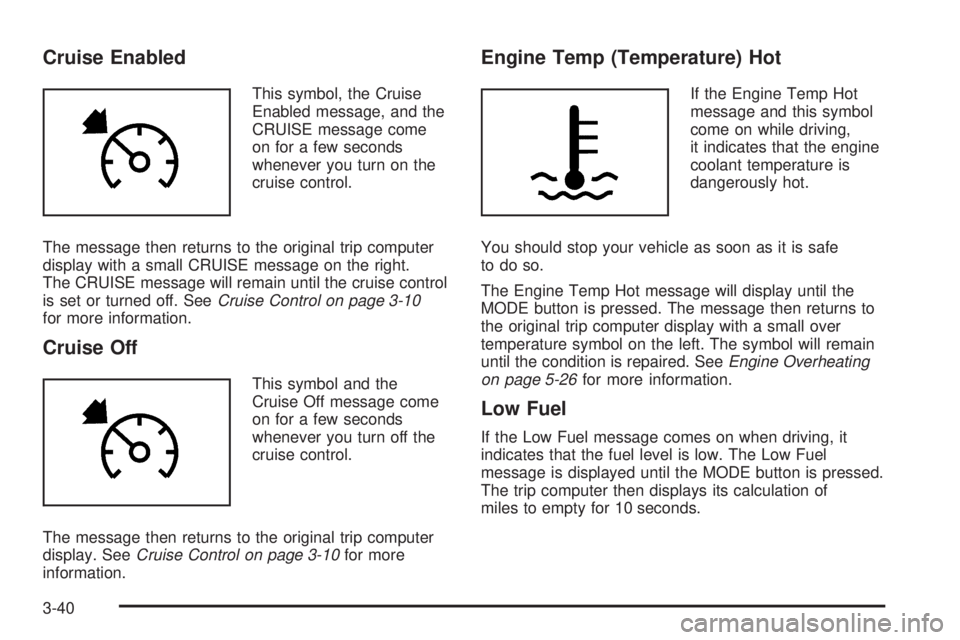
Cruise Enabled
This symbol, the Cruise
Enabled message, and the
CRUISE message come
on for a few seconds
whenever you turn on the
cruise control.
The message then returns to the original trip computer
display with a small CRUISE message on the right.
The CRUISE message will remain until the cruise control
is set or turned off. SeeCruise Control on page 3-10
for more information.
Cruise Off
This symbol and the
Cruise Off message come
on for a few seconds
whenever you turn off the
cruise control.
The message then returns to the original trip computer
display. SeeCruise Control on page 3-10for more
information.
Engine Temp (Temperature) Hot
If the Engine Temp Hot
message and this symbol
come on while driving,
it indicates that the engine
coolant temperature is
dangerously hot.
You should stop your vehicle as soon as it is safe
to do so.
The Engine Temp Hot message will display until the
MODE button is pressed. The message then returns to
the original trip computer display with a small over
temperature symbol on the left. The symbol will remain
until the condition is repaired. SeeEngine Overheating
on page 5-26for more information.
Low Fuel
If the Low Fuel message comes on when driving, it
indicates that the fuel level is low. The Low Fuel
message is displayed until the MODE button is pressed.
The trip computer then displays its calculation of
miles to empty for 10 seconds.
3-40
Page 199 of 318
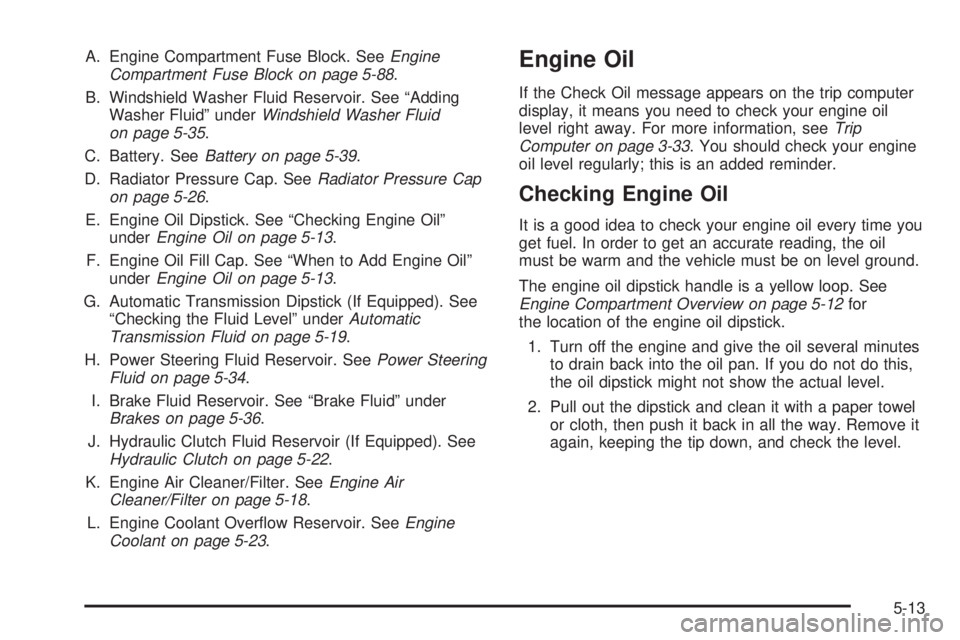
A. Engine Compartment Fuse Block. SeeEngine
Compartment Fuse Block on page 5-88.
B. Windshield Washer Fluid Reservoir. See “Adding
Washer Fluid” underWindshield Washer Fluid
on page 5-35.
C. Battery. SeeBattery on page 5-39.
D. Radiator Pressure Cap. SeeRadiator Pressure Cap
on page 5-26.
E. Engine Oil Dipstick. See “Checking Engine Oil”
underEngine Oil on page 5-13.
F. Engine Oil Fill Cap. See “When to Add Engine Oil”
underEngine Oil on page 5-13.
G. Automatic Transmission Dipstick (If Equipped). See
“Checking the Fluid Level” underAutomatic
Transmission Fluid on page 5-19.
H. Power Steering Fluid Reservoir. SeePower Steering
Fluid on page 5-34.
I. Brake Fluid Reservoir. See “Brake Fluid” under
Brakes on page 5-36.
J. Hydraulic Clutch Fluid Reservoir (If Equipped). See
Hydraulic Clutch on page 5-22.
K. Engine Air Cleaner/Filter. SeeEngine Air
Cleaner/Filter on page 5-18.
L. Engine Coolant Overflow Reservoir. SeeEngine
Coolant on page 5-23.Engine Oil
If the Check Oil message appears on the trip computer
display, it means you need to check your engine oil
level right away. For more information, seeTrip
Computer on page 3-33. You should check your engine
oil level regularly; this is an added reminder.
Checking Engine Oil
It is a good idea to check your engine oil every time you
get fuel. In order to get an accurate reading, the oil
must be warm and the vehicle must be on level ground.
The engine oil dipstick handle is a yellow loop. See
Engine Compartment Overview on page 5-12for
the location of the engine oil dipstick.
1. Turn off the engine and give the oil several minutes
to drain back into the oil pan. If you do not do this,
the oil dipstick might not show the actual level.
2. Pull out the dipstick and clean it with a paper towel
or cloth, then push it back in all the way. Remove it
again, keeping the tip down, and check the level.
5-13
Page 209 of 318
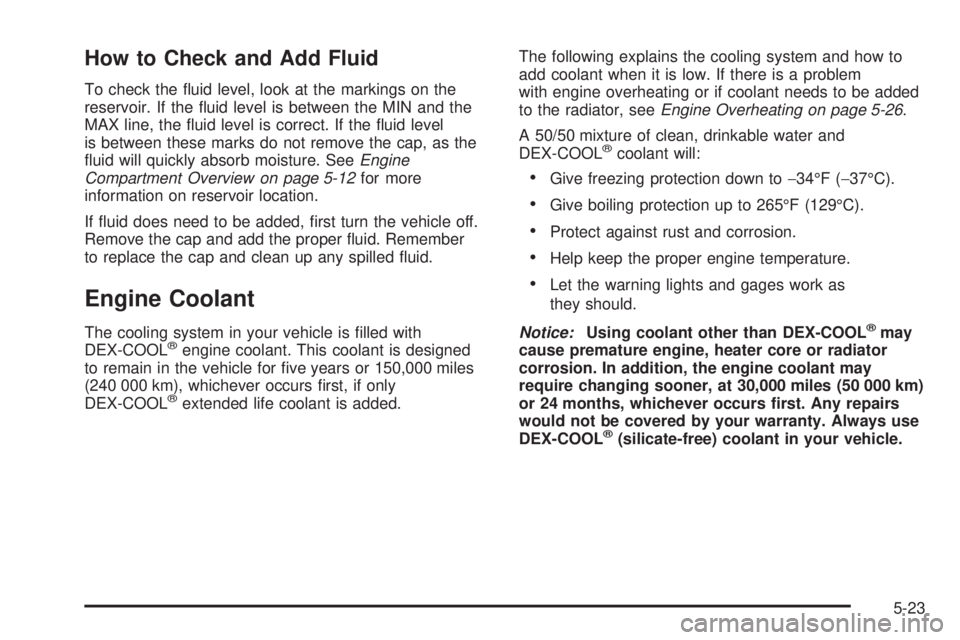
How to Check and Add Fluid
To check the fluid level, look at the markings on the
reservoir. If the fluid level is between the MIN and the
MAX line, the fluid level is correct. If the fluid level
is between these marks do not remove the cap, as the
fluid will quickly absorb moisture. SeeEngine
Compartment Overview on page 5-12for more
information on reservoir location.
If fluid does need to be added, first turn the vehicle off.
Remove the cap and add the proper fluid. Remember
to replace the cap and clean up any spilled fluid.
Engine Coolant
The cooling system in your vehicle is filled with
DEX-COOL®engine coolant. This coolant is designed
to remain in the vehicle for five years or 150,000 miles
(240 000 km), whichever occurs first, if only
DEX-COOL
®extended life coolant is added.The following explains the cooling system and how to
add coolant when it is low. If there is a problem
with engine overheating or if coolant needs to be added
to the radiator, seeEngine Overheating on page 5-26.
A 50/50 mixture of clean, drinkable water and
DEX-COOL
®coolant will:
•Give freezing protection down to−34°F (−37°C).
•Give boiling protection up to 265°F (129°C).
•Protect against rust and corrosion.
•Help keep the proper engine temperature.
•Let the warning lights and gages work as
they should.
Notice:Using coolant other than DEX-COOL
®may
cause premature engine, heater core or radiator
corrosion. In addition, the engine coolant may
require changing sooner, at 30,000 miles (50 000 km)
or 24 months, whichever occurs �rst. Any repairs
would not be covered by your warranty. Always use
DEX-COOL
®(silicate-free) coolant in your vehicle.
5-23
Page 211 of 318

The coolant level should be checked at each fuel fill, by
looking at the dipstick in the coolant overflow reservoir.
To remove the dipstick, push down on the coolant
reservoir cap while turning it counterclockwise.
When your engine is cold, the coolant level should be at
or above the bottom arrow on the dipstick. After the
vehicle has been driven and the engine is at normal
operating temperature, the level should be somewhere
between the two arrows on the dipstick.
If the coolant level is correct, replace the dipstick then
push down on the coolant reservoir cap while turning
it clockwise until it stops, to lock it into position.
Adding Coolant
If you need more coolant, add the proper DEX-COOL®
coolant mixture at the coolant overflow reservoir, but
be careful not to spill it. Check the level with the dipstick
and keep adding fluid until the level is correct.
{CAUTION:
You can be burned if you spill coolant on hot
engine parts. Coolant contains ethylene glycol,
and it will burn if the engine parts are hot
enough. Do not spill coolant on a hot engine.
When the level is correct, replace the dipstick then push
down on the coolant reservoir cap while turning it
clockwise until it stops, to lock it into position.
5-25
Page 214 of 318

2. If the fan is working and the temperature gage
needle has not returned to its normal position
within a few minutes, stop the engine and remove
the ignition key.
Look for leaks at the radiator hoses and
connections, heater hoses and connections,
radiator, and water pump. Be careful when checking
these areas as they will probably still be hot. If
you find a major leak or other problems that may
have caused the engine to overheat, do not run the
engine until these problems have been corrected.
If you do not find anything wrong, you should check
the engine coolant level. SeeEngine Coolant on
page 5-23. You should also check the air intake
area below the front bumper to ensure that it is clear
of leaves and road grime.3. Turn off your air conditioning and turn on your
heater to full hot at the highest fan speed and
open the windows as necessary.
If you no longer have the overheat warning, you can
drive. Just to be safe, drive slower for about 10 minutes.
If the warning does not come back on, you can drive
normally.
If the warning continues and you have not stopped, pull
over, stop, and park your vehicle right away.
If there is still no sign of steam, you can idle the engine
for three minutes while you are parked. If you still
have the warning, turn off the engine and get everyone
out of the vehicle until it cools down.
You may decide not to lift the hood but to get service
help right away.
5-28
Page 215 of 318
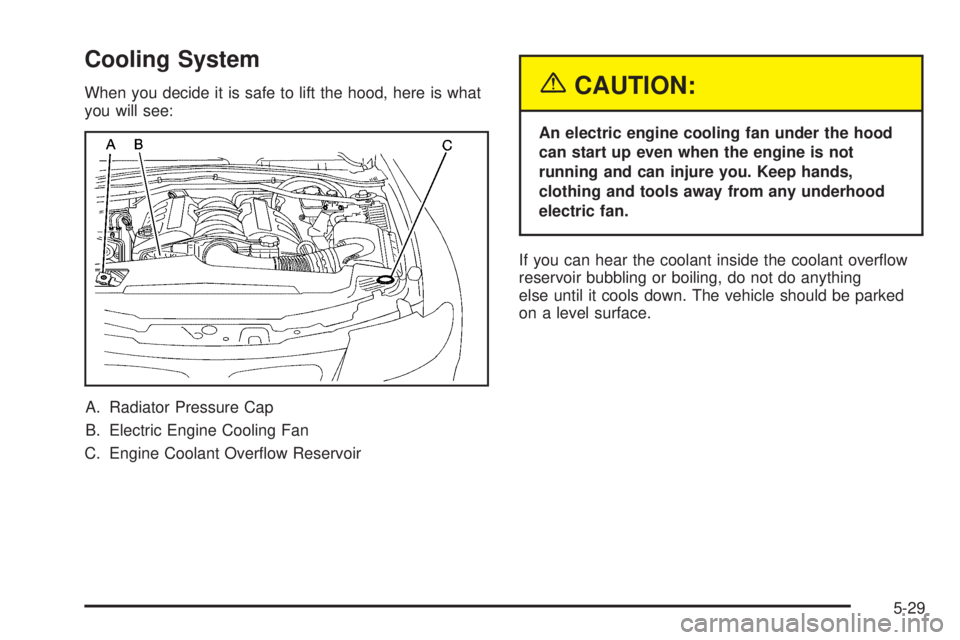
Cooling System
When you decide it is safe to lift the hood, here is what
you will see:
A. Radiator Pressure Cap
B. Electric Engine Cooling Fan
C. Engine Coolant Overflow Reservoir{CAUTION:
An electric engine cooling fan under the hood
can start up even when the engine is not
running and can injure you. Keep hands,
clothing and tools away from any underhood
electric fan.
If you can hear the coolant inside the coolant overflow
reservoir bubbling or boiling, do not do anything
else until it cools down. The vehicle should be parked
on a level surface.
5-29
Page 216 of 318
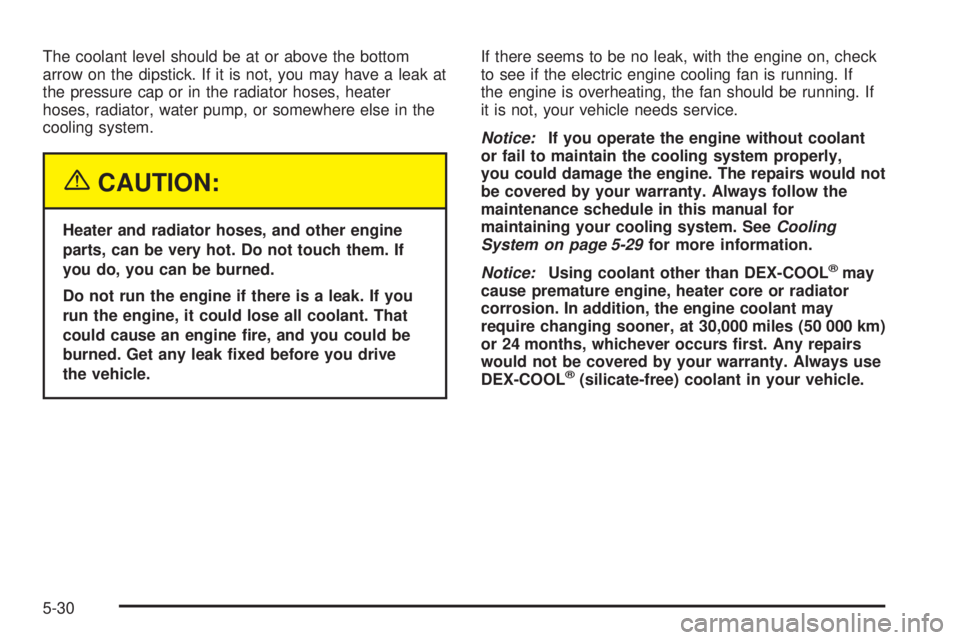
The coolant level should be at or above the bottom
arrow on the dipstick. If it is not, you may have a leak at
the pressure cap or in the radiator hoses, heater
hoses, radiator, water pump, or somewhere else in the
cooling system.
{CAUTION:
Heater and radiator hoses, and other engine
parts, can be very hot. Do not touch them. If
you do, you can be burned.
Do not run the engine if there is a leak. If you
run the engine, it could lose all coolant. That
could cause an engine �re, and you could be
burned. Get any leak �xed before you drive
the vehicle.If there seems to be no leak, with the engine on, check
to see if the electric engine cooling fan is running. If
the engine is overheating, the fan should be running. If
it is not, your vehicle needs service.
Notice:If you operate the engine without coolant
or fail to maintain the cooling system properly,
you could damage the engine. The repairs would not
be covered by your warranty. Always follow the
maintenance schedule in this manual for
maintaining your cooling system. SeeCooling
System on page 5-29for more information.
Notice:Using coolant other than DEX-COOL
®may
cause premature engine, heater core or radiator
corrosion. In addition, the engine coolant may
require changing sooner, at 30,000 miles (50 000 km)
or 24 months, whichever occurs �rst. Any repairs
would not be covered by your warranty. Always use
DEX-COOL
®(silicate-free) coolant in your vehicle.
5-30
Page 217 of 318
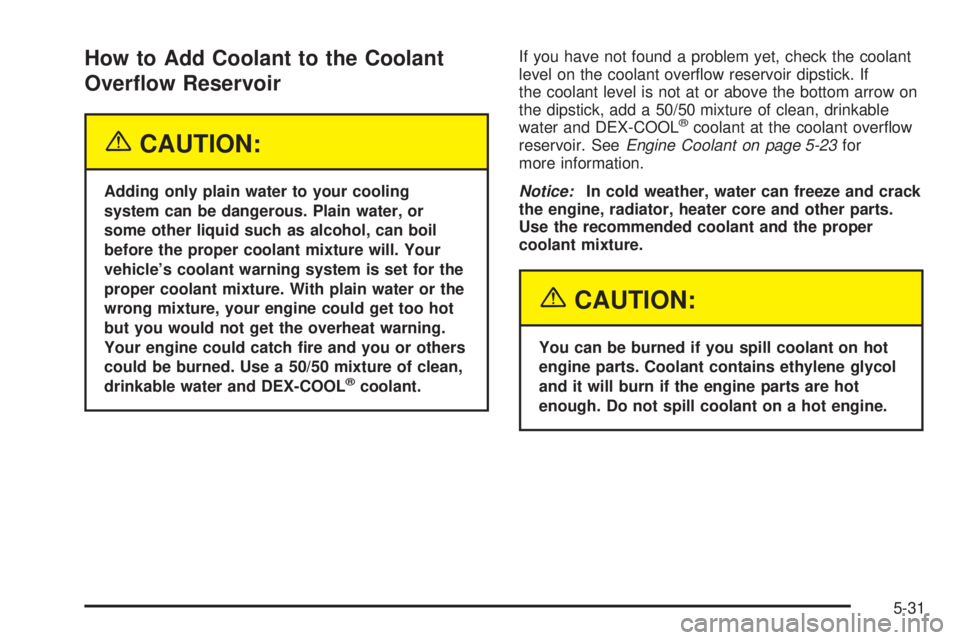
How to Add Coolant to the Coolant
Over�ow Reservoir
{CAUTION:
Adding only plain water to your cooling
system can be dangerous. Plain water, or
some other liquid such as alcohol, can boil
before the proper coolant mixture will. Your
vehicle’s coolant warning system is set for the
proper coolant mixture. With plain water or the
wrong mixture, your engine could get too hot
but you would not get the overheat warning.
Your engine could catch �re and you or others
could be burned. Use a 50/50 mixture of clean,
drinkable water and DEX-COOL
®coolant.If you have not found a problem yet, check the coolant
level on the coolant overflow reservoir dipstick. If
the coolant level is not at or above the bottom arrow on
the dipstick, add a 50/50 mixture of clean, drinkable
water and DEX-COOL
®coolant at the coolant overflow
reservoir. SeeEngine Coolant on page 5-23for
more information.
Notice:In cold weather, water can freeze and crack
the engine, radiator, heater core and other parts.
Use the recommended coolant and the proper
coolant mixture.
{CAUTION:
You can be burned if you spill coolant on hot
engine parts. Coolant contains ethylene glycol
and it will burn if the engine parts are hot
enough. Do not spill coolant on a hot engine.
5-31
Page 219 of 318

How to Add Coolant to the Radiator
Notice:Your engine has a speci�c radiator
�ll procedure. Failure to follow this procedure could
cause your engine to overheat and be severely
damaged.
1. You can remove the radiator pressure cap when
the cooling system, including the radiator pressure
cap and upper radiator hose, is no longer hot.
SeeEngine Compartment Overview on page 5-12
for more information on the location of the
radiator pressure cap.
Turn the pressure cap slowly counterclockwise until
it first stops. Do not press down while turning the
pressure cap. If you hear a hiss, wait for that to stop.
A hiss means there is still some pressure left.
2. Then keep turning the pressure cap, but now push
down as you turn it. Remove the pressure cap.
3. Fill the radiator with the proper DEX-COOL
®coolant
mixture, up to the base of the filler neck. See
Engine Coolant on page 5-23for more information
about the proper coolant mixture.4. Rinse or wipe any spilled coolant from the engine
and the compartment.
5. Then fill the coolant overflow reservoir to the bottom
arrow on the dipstick.
6. Put the cap back on the coolant overflow reservoir,
but leave the radiator pressure cap off.
7. Start the engine and let it run until you can feel the
upper radiator hose getting hot. Watch out for the
engine cooling fan.
8. By this time, the coolant level inside the radiator fill
neck may be lower. If the level is lower, add more
of the proper DEX-COOL
®coolant mixture
through the filler neck until the level reaches the
base of the filler neck.
9. Then replace the radiator pressure cap. At any time
during this procedure, if coolant begins to flow out
of the filler neck, reinstall the pressure cap. Be
sure the pressure cap is hand-tight and fully seated.
10. Check the coolant in the overflow reservoir.
The level should be at the bottom arrow on
the dipstick when the engine is cold.
See your dealer, if necessary.
5-33